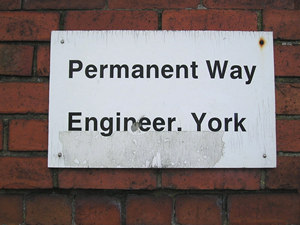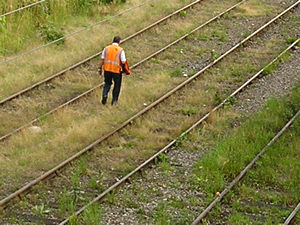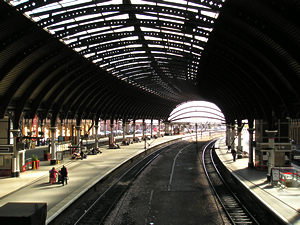
Rail, roads, rivers – The Permanent Way
May 2007

This sign was photographed in April 2006, and is perhaps still there, on Leeman Road, on the corner of a massive soon-to-be-redeveloped brownfield site known as "York Central".
It reads "Permanent Way Engineer. York."
Like many people in York I'm from a "railway family", and to me it's such a poetic, soul-stirring phrase – the Permanent Way.
It means, of course, the actual line, the bolted-together bit on the ground. I've read an explanation of where the phrase comes from, but the explanation doesn't take away the stirring romantic visions the phrase creates, of solid, dependable, everlasting railway lines, all shiny and heading off to a vanishing point in the shimmering distance.
I've recently discovered more about my railwaymen ancestors, who I know I've mentioned many times before on this site. Our connection goes back further than I thought – to the earliest days of the railways in this area. My father's branch of the family were there at the beginning, taking advantage of the work available to labourers during the 1840s railway mania.

My ancestors were living in rural Yorkshire in the 1840s, working on the farms. The railways came and cut through the landscape, and the men who worked in the fields went to work on the railway. The York to Scarborough line opened in 1845, taking the line it still holds, past Rillington and many other villages.
The census shows that my great-great-great grandfather was an agricultural labourer, in Rillington, in 1841. By the time of the 1851 census, he is a railway labourer, then a railway platelayer, and from then on, they're all railwaymen. His son, a railway platelayer too, maintaining the Permanent Way.
And then his son, Charles, born at one of the small village railway stations, becomes a railway porter. He moves from the area to various other small railway stations in Yorkshire, and marries the daughter of another railwayman.

After many moves, along the York-Scarborough line and others, the railway brings my great-grandparents to York, in the early 1900s. My great-grandfather is a railway porter, at York station, all the rest of his working life.
His son Stanley, my grandfather, works on the Permanent Way. And then his son, my father, works in the railway offices, all his working life.
My brother, on leaving school, worked in the York Carriageworks. Which might have been for his whole working life. But it closed in 1996, as a result of rail privatisation. Bringing to an end 150 years of our particular family tradition.
The carriageworks land has been redeveloped, and the land where the Permanent Way Engineer worked awaits its glorious and much-hyped future – no doubt as a site for more apartments which my younger relatives won't be able to afford.
The "Permanent Way" is of course not permanent at all. It needs maintaining and parts need replacing, and indeed half of it was ripped up altogether in the 1960s. The phrase belongs in the heady, confident, reckless days of railway expansion, when York became a major railway city. As I'm writing these pages about York today another railway phrase comes to mind: "All change".
When this site started in 2004 I spent a lot of time wandering around taking photos of railway-related things.
At that time the area off Leeman Road was easy to wander into – now it is protected by a steel fence, so I'm glad I got the photos when I did. See York's other railway museum. There's also a page on the former York Carriageworks site.
For the major railway buildings, including the station, see Railway city.